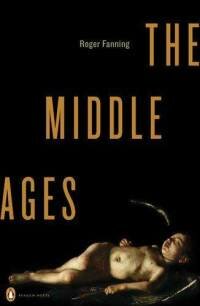 “Peter’s bloody ear restored askew,” is the last line of a Roger Fanning poem in his collection The Middle Ages, and that is a salient detail because, through metonymy, poets are mostly ears and tongues. This is Fanning’s first collection in almost a decade–he lives in Seattle and teaches at Warren Wilson College–and what a decade it turned out to be for the Whiting Award-winner, whose first collection The Island Itself was a National Poetry Series selection.
“Peter’s bloody ear restored askew,” is the last line of a Roger Fanning poem in his collection The Middle Ages, and that is a salient detail because, through metonymy, poets are mostly ears and tongues. This is Fanning’s first collection in almost a decade–he lives in Seattle and teaches at Warren Wilson College–and what a decade it turned out to be for the Whiting Award-winner, whose first collection The Island Itself was a National Poetry Series selection.
There is war, marital strife, and mental discord, resulting in Fanning’s hospitalization as doctors try to treat his break with reality. In other hands, this might simply be a gruesome irruption, but Fanning is no dewy-eyed word-jumbler; his interests in tracking his mental decline are less confessional than they are an attempt to bring this into the light–to acknowledge the crazy person who was also called Roger Fanning. “Language remembers. People forget,” he says in “Caul Me Ishmael.”
So what does the reader learn? It’s easy to think of the insane person as their insanity–we almost can’t help it, we believe in personhood so strongly. People shout strange things, strange things don’t shout themselves. Do they? Fanning’s poems show the way the unbalanced mind continually revolves around strange attractors: His imagination is taken over by pornography, his paranoia creates G-men about to “frogmarch” him away. From “My Madness: Sick Minutiae, Ecstasy”:
Meanwhile, on occasion, I
experience
the Aurora Borealis as music, an
inhuman ecstasy rushing over me.That is Heaven: tears
rolling into my ears.This is Hell:
its little animals, its little words
scrawling all over
my unhoused psyche.
Some of these poems are of more interest as documentary than as poetry, it’s true. But as the collection progresses, Fanning adds more pieces of himself to the puzzle, and his technical skills return. His words form stronger welds, though there’s a lingering sense of the grotesque that they can’t quite imprison.
Among the ankle-bending beach stones
and sun-bleached beer and soda cans,
…he writes with the musicality of a hobo Keats,
it startled me (like parting weeds
to find two leprechauns fucking
on a pile of gold doubloons) to flipa starfish…
“Night Needles, Haystack Days,” his poem about the things shared and unshared by him and his autistic son, is of the same lyrical bent: “But I / don’t need to hunt, I have my loves / and hates. Heartward, always, rides / the needle on the rapids of my blood.” Later in the poem, after a spasm of rage, he says, “it is our luck that such picayune states pass. / The cloud-roiled sky clears, indigo, a good clear dark.” Within this collection, this seems to have wider referents.
There is also an email to Allen Iverson, and some thoughts on Mad Cow Disease and the Buffalo Commons. To summarize the breadth of Fanning’s magpie poetry would be a daunting task. The net effect, though, is to become acquainted with this kind of voice, in its ups and downs, its ins and outs of humor, outside of the moment of crisis. Fanning is not afraid to be picayune, just as he is not afraid to detail an unsavory lust or jot a few lines about a dream after Thanksgiving dinner.
“This is how Jesus explains Heaven to the thief,” he sums up, “I will be with you today.”